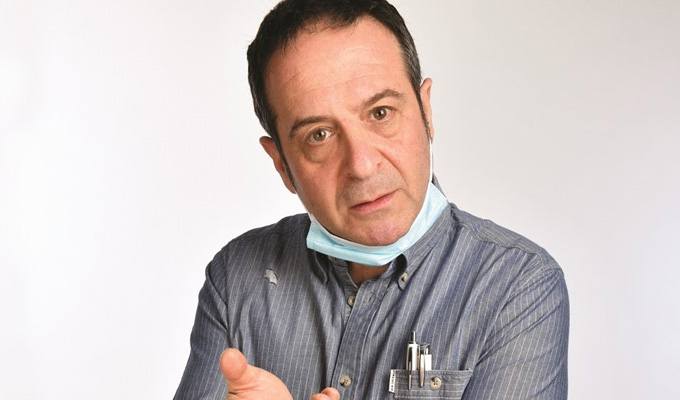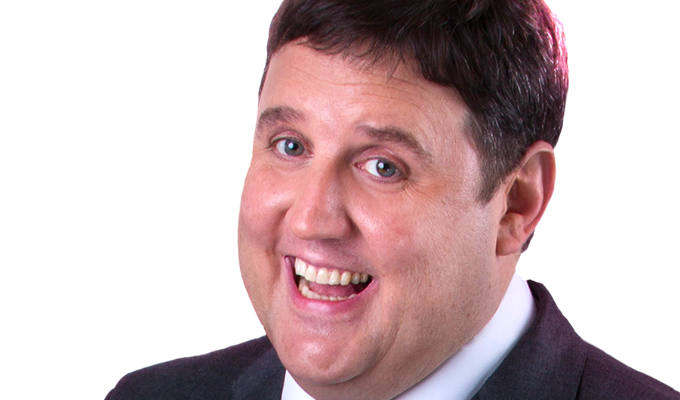
Mark Thomas - Check Up: Our NHS At 70
Note: This review is from 2018
Review by Steve Bennett at Latitude
For his theatre show marking the 70th anniversary of the health service, Mark Thomas is more documentarian than comedian. He has spent a month on the wards and interviewed health experts and policy-makers in a series of public events to paint a picture of the NHS now, and in the years and decades to come.
It’s an ambitious brief by any standards, given that the challenges facing this behemoth are myriad, impacting everyone in the country, and linked into so many aspects of the state, from taxation to social care to wider policies that have an effect on public health.
Thomas rushes through at breakneck speed, parking some issues almost as soon as he raises them out of necessity. It gives the show the same sense of urgency as the busiest emergency room. And although he is a political comedian discussing one of the hottest of political potatoes, Thomas starts from the personal rather than the institutional; the patients more than the processes.
The broad framework is that 54-year-old Thomas asked a doctor to explain all that could go wrong with him from now on…and the medic replied in great detail – and unseemly glee.
For each of the main ailments, the comic then went to spend time on the front line, experiencing the likes of stomach surgery, renal units and dementia care. Combined with the expert voices it gives a coherent overview of a complex institution. We start, though in casualty, with Thomas giving a condensed version of his time there: a sort of 2.4 minutes in A&E, told with a compelling drama that captures the intensity of the life-and-death scramble.
Alongside all this reportage, the political issues emerge, most crucially how health is linked to wealth, and not just in the obvious way: that the more money we can spend on the NHS and social care – and we will have to pay for that with tax – the better the results. But also the way the poor are robbed of years of life from the stresses rooted in poor housing and insecure jobs. Thomas reveals that the life expectancy in the estates near Grenfell Tower is a shocking 22 years shorter than a couple of miles away in Knightsbridge.
Thomas also gets Frank Dobson to admit that the private finance initiatives used to build hospitals on his watch as Labour Health Minister are his biggest regret, saddling health trusts with massive debts to subsidise private, risk-free profit for companies and their directors.
The links between capitalism and health are not always that obvious. For example that, without legislation to stop them, livestock farmers, especially overseas, routinely inject their herds with antibiotics for the purely commercial reason that it’s cheaper than good animal husbandry. That means the bacteria builds up resistance and human drugs, so crucial in operations not just everyday illness control, become dangerously ineffective.
All this sounds very serious, and it is. Thomas doesn’t underplay how crucial his subject matter is to everyone, and he’s surely well-advised not to advertise it as a comedy.
Yet it is tempered with his impish wit, from the way he describes his own reaction to the medical dramas he witnesses, or the way he affectionately characterises some of the health workers he encounters (showing off his range of accents while he’s at it),or describing the creative solutions the dementia workers come up with to make their charges feel normal.
As always, Thomas is driven by a fire in his belly. But he doesn’t let his passion obscure reality. Warning against the perils of ‘British exceptionalism’ which leads us to overstate the UK’s global achievement, he takes pains to dispel that on evidence the NHS is not the ‘best in the world’. On most measures, it is safely mid-table.
Yet he leaves in not doubt that the people who work there, all 1million of them, make it so much better than it might otherwise be… and as to how only money will sustain the NHS, and not from corporate parasites picking profits from the ill.
Review date: 15 Jul 2018
Reviewed by: Steve Bennett
Reviewed at:
Latitude






